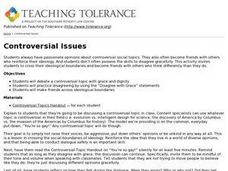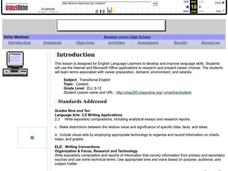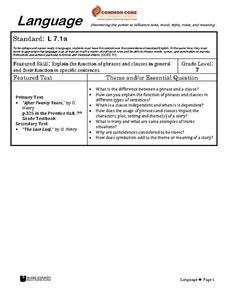Positively Autism
"Saying 'No, Thank You'" Social Skills Story
Teach learners to use polite words when they do not want something, rather than being rude or aggressive, using these simple presentation slides. The presentation walks students step by step through what it means to say "No,...
Creative Visions Foundation
Studying Documentaries Like a Writer - Looking For Persuasive Techniques
Revisit the documentaries viewed in the previous lesson in this series in order to take a look at the persuasive techniques employed by the documentary creators. Small groups watch the films a second time, taking notes on two provided...
Broadway Teaching Group
Acting the Song
Get to know the meaning behind the song "Somewhere Over the Rainbow" from the legendary 1939 film The Wizard of Oz. Groups of two take the roles of performer and questioner. Performers sing lines of the song while questioners...
Scholastic
Mindful Listening
Teach your middle schoolers to use their ears to their highest potential! Pupils practice active listening skills and reflect on how careful listening might prove to be important in and out of the classroom.
Curated OER
Las Palabras Interrogativas
Cuáles son tus libros? Teach your beginning Spanish speakers how to use interrogative words and form questions. Provide some opportunities for learners to use these new interrogative words in practice.
Developing a Global Perspective for Educators
Imagine Being Me
The design of this two-day lesson eloquently exposes learners to the topic of social justice for people with disabilities. The plan is built off the reading of Are You Alone on Purpose? by Nancy Werlin. The activity introduces...
Read Works
Halloween Leftovers
Halloween isn't fun for everyone — but playing together is! Read about Esme and her space pirate friend with a short reading passage, accompanied by ten short answer questions.
PBS
Robot Body Language
Don't be so emotional! Scholars take part in an activity where they consider how future robots will be able to show emotions. They place paper bags over their heads, act out emotions through body movements, and have others guess the...
Curated OER
Children's Playthings And Books
Students categorize studenT toys by intelligence types. They review toy safety and function and identify the appropriate play age of various toys. They read and evaluate studenT books and write one of their own.
Curated OER
Post-Colonial Writers Unit
How do cultural and historical background impact thought? To explore this essential question, class members view of portion of the film, The Passage to India, read an excerpt from The Magician’s Nephew, and Nissim Ezekiel’s...
Curated OER
Getting Down to Business
Three lesson plans are shown on this site, two of which pertain to Read 180. Start the year with the first lesson by having your learners create a brochure about themselves. In the computer lab, they find clip art and photos to make a...
Curated OER
Kindergarten Music Time
Little ones are led through a series of rhythmic songs and chants while they march, clap, and use their tummies as percussive instruments. They work on singing in pitch, chunking, and keeping a steady beat.
Curated OER
Elementary Music Plan
Hey Macarena! Third graders keep time while they sing a Latin Folk Song. To practice keeping a steady rhythm and singing in pitch, the class sings the Folk Song together and in a round while keeping a beat. They then learn to do the...
Curated OER
Same and Different Through Music and Art
This instructional activity is intended for a music class but would be a great way to teach compare and contrast to any class. Kindergarteners dance the Hokey Pokey to four different styles of music and examine two paintings of Humpty...
Curated OER
Controversial Issues
Hot topics are often engaging and can get heated. High School learners engage in an academic discussion were they must learn to engage with a person holding a different view than their own. They practice discussing different opinions...
Curated OER
Boogie Woogie with a B: Using Alliteration while Exploring Patriotic Tunes
Are you looking for a way to bring writing into your history lesson - or history into your writing lesson? This cross-curricular activity is helpful and fun, no matter what class you're teaching! Using "Boogie Woogie Bugle Boy" by the...
Curated OER
Exploring Careers
The world is full of possibilities for your ELLs. Help them explore their career options with a lesson that incorporates Internet research and expository writing. Not only will they learn more about their careers of choice, but both...
Curated OER
Communication, Day 2: Assertiveness
Having social skills and being able to assert yourself in a positive way is so important. Students with mild to moderate disabilities engage in a series of activities to practice assertive communication and social skills. Perfect for a...
Curated OER
Speaking and Listening
What a terrific presentation! It takes learners through a step-by-step explanation to create a new type of chocolate bar, advertise the product, and design a presentation. This is a creative way to get your class writing and thinking...
Curated OER
Line Up Balls
At times special needs or Autistic children have a difficult time disengaging from a lesson to line up at the door. This brief strategy overview employs mini-porcupine balls and a pocket. It was developed to help pupils...
Wake County Public Schools
Language
Have your class doing everything from reading literature, analyzing literary devices, identifying independent and dependent clauses, discussing, and writing creatively with the rich resource found here. After a mini lesson on independent...
King Country
Lesson 9: Communication - Day 2: Assertiveness
Appropriate assertive and non-verbal assertive communication is the focus of this lesson designed for the special education classroom. Using mirrors, class members practice assertive responses to a variety of situations.
Macmillan Education
Social Skills
Every culture has a set of social skills one must learn to establish and maintain relationships. Some of these skills are particular to a culture and some are universal. Class members practice using appropriate language,...
Scholastic
Tell Us a Tale: Teaching Students to Be Storytellers
Encourage scholars to retell their favorite short story or folktale, adding personal details to make it their own. After reading their book of choice several times, story tellers retell a tale verbally to their classmates.
Other popular searches
- Tone of Voice
- Voice, Tone, Audience
- Tone of Voice Poetry
- Appropriate Tone of Voice
- Voice Tone Audience
- Puppets Tone of Voice
- Tone and Voice
- Authors Tone and Voice
- Acceptable Voice Tones
- Tone, Voice
- Tone Voice























